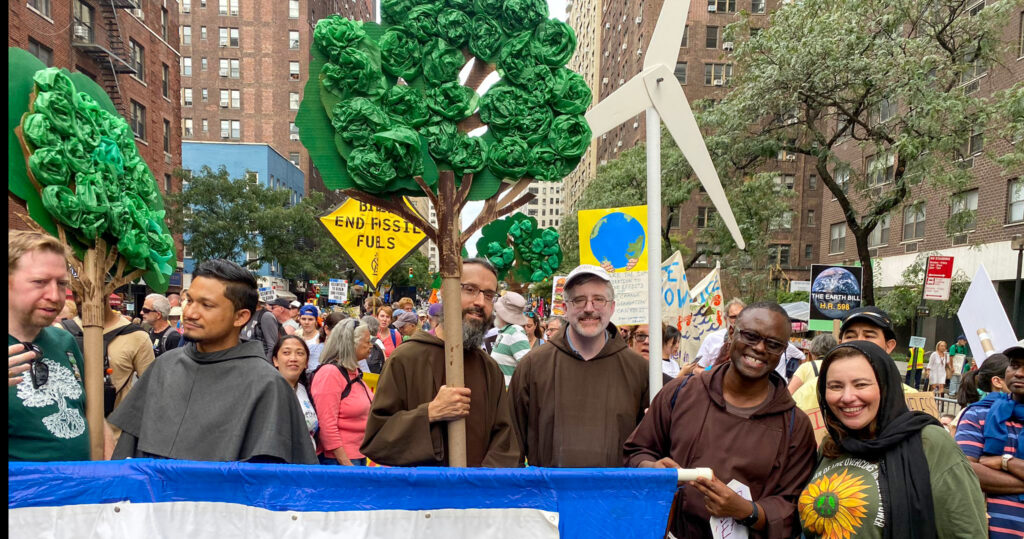Over the next two weeks, 140 world leaders and over 70.000 other delegates, ranging from religious leaders to corporate lobbyists, are expected to descend on Dubai in the United Arab Emirates (UAE) for the UN Climate Conference. Here, they will assess the progress made toward realizing the goals of the 2015 Paris Agreement. The urgency is clear: COP28 has been preceded by several scientific reports, whose findings are both increasingly dire and, sadly, effectively ignored.
The window to limit global heating to 1.5 degrees Celsius is rapidly closing and would require radical interventions. As things stand, even fully implementing the promises already made by governments to cut emissions will still push temperatures up to 2.5 degrees above pre-industrial levels.
Worryingly, the UN Climate Conferences themselves have come under increasing criticism for offering a platform to polluters to ‘greenwash’ their activities. COP27 was marked by an “explosion” of corporate lobbyists. Concerns about the ‘corporate capture’ of the conferences echo those in other UN processes, such as the ongoing negotiations on a treaty on transnational corporations. Also at COP27, Egyptian authorities placed severe restrictions on civil society, threatening to deprive the deliberations of many critical voices from affected communities.
COP28 is facing similar questions about its legitimacy after the UAE selected the CEO of its state-owned oil company as conference chair. This means that the negotiations on whether to phase out the use of fossil fuels entirely will now be led by an oil executive whose company is reportedly using COP28 as an opportunity to promote new oil deals. Meanwhile, conscious of the severe restrictions on civic space in the UAE, climate activists have expressed fear of surveillance and detention during the conference.
“Now more than ever” has become somewhat of a cliché in the world of advocacy but it remains true in many cases – most critically in regard to climate change. We are quickly running out of time to take climate action and have already passed certain tipping points, locking in the now inevitable adverse climate impacts on people and the planet. Yet every day we do act, we can prevent more future harm.
What is at stake?
Despite its shortcomings, the Paris Agreement still offers one of the most robust international frameworks to compel States to act. In this context, Franciscans International will be closely monitoring the following developments at COP28:
- The conference will include the first global stocktake (GTS), through which countries and other stakeholders will assess the progress in reducing emissions through the national commitments that they made following the Paris Agreement – and identify where they are falling behind. Although it is clear that we are woefully off track to keep average global temperatures “well below 2°C”, the GTS can be leveraged to accelerate the ambition of the next round of national action plans, which are due in 2025.
- State delegates are also expected to reach a decision on whether to phase out fossil fuels – that is, to completely eliminate them – or whether to merely phase down their use. The continued extraction of gas, oil, and coal by companies does not only harm our planet – it is also negatively impacting an array of human rights, including the right to health and the right to a clean, healthy, and sustainable environment. A decision to phase out fossil fuels is essential to protect both our common home and our human rights.
- Negotiations on a loss and damage fund should be concluded at COP28. Through this mechanism, wealthy countries – historically responsible for the most emissions – should provide financial support to poorer countries to mitigate the damages of the climate crisis and facilitate the shift away from fossil fuels. An equitable and effective mechanism will be critical to ensure that nobody is left behind.
- For the first time ever, the UN Climate Conference will feature a faith pavilion, which further reinforces the UN’s strong engagement with religious communities on climate issues. Although Pope Francis was forced to cancel his visit due to health reasons, Anglican Archbishop Julio will join other faith leaders, emphasizing that climate justice is not only a political and human rights issue, but also a moral and spiritual imperative.
COP28 also coincides with the 75th anniversary of the Universal Declaration of Human Rights on 10 December. Later that week, on 15 December, the prestigious UN Human Rights Prize will be awarded to an international coalition of civil society organizations that includes FI for its role in advocating for the recognition of the right to a healthy environment – a pointed reminder that environmental issues are also human rights issues. Through its recognition of this right, the UN General Assembly has laid the groundwork for a rights-based approach to global environmental action.
As the delegates gather at COP28, they must meet the moment and finally fulfill their obligations under international law. They should know that the world is watching and that anything short of urgent and inclusive action is not an option. In the words of UN General Secretary Antonio Guterres: “We have a choice. Collective action or collective suicide. It is in our hands.”.
Where to find us during COP28:
Talanoa Interfaith Gathering
(30 November – 12:30 CET)
Based on a traditional form of dialogue by the Indigenous People of Fiji to solve problems within the community, we’ll meet to exchange our initiatives, concerns, and hopes in our work for climate justice.
The Right to a Healthy Environment – What Next?
(1 December – 13:45 CET)
During a high level event that will be opened by the President of Slovenia, we will explore how the right to a healthy environment can be mainstreamed, implemented, and codified by the international climate community.

